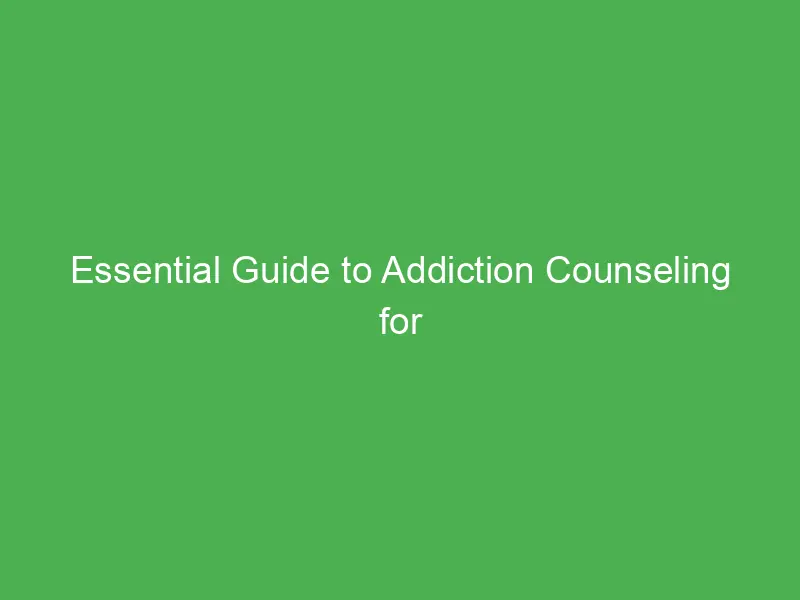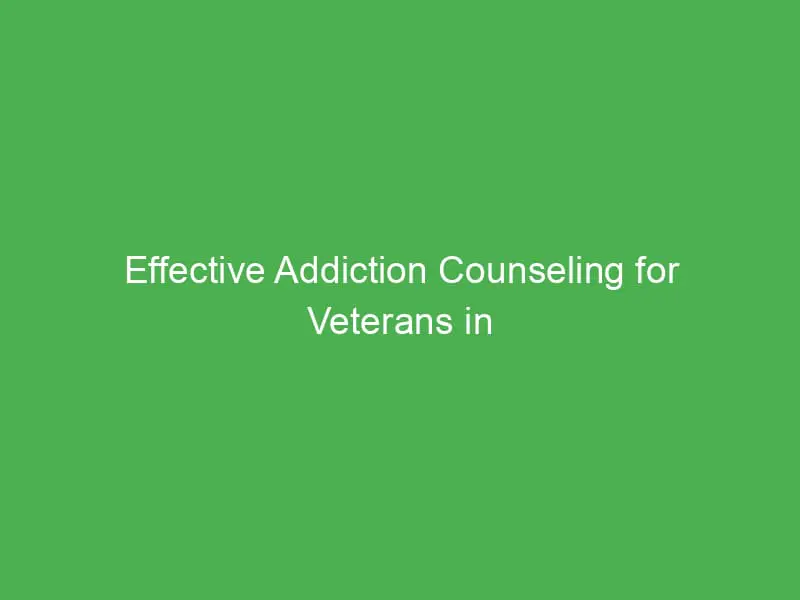Addiction is a complex issue that affects countless women across Australia, often leading to feelings of isolation and despair. As societal attitudes shift and awareness grows, addiction counselling specifically tailored for women is becoming increasingly vital. These programmes not only address the unique challenges women face but also empower them to reclaim their lives and build healthier futures.
In Australia, a range of counselling services offers support, understanding, and effective strategies for recovery. From holistic approaches to evidence-based therapies, these services aim to create safe spaces where women can share their experiences and heal together. By focusing on the specific needs of women, addiction counselling plays a crucial role in fostering resilience and promoting long-term recovery.
• What is addiction counseling for women in Australia?
Addiction counseling for women in Australia is a specialised approach designed to address the unique challenges women face regarding substance use and addictive behaviours. These counselling services aim to provide tailored support, focusing on emotional, psychological, and social factors that contribute to addiction in women.
Key Aspects of Addiction Counseling
- Individualised Treatment Plans
Addiction counselling for women often begins with assessments to understand individual needs and circumstances. Professionals develop customised plans that incorporate various therapeutic modalities, ensuring a comprehensive approach to treatment.
- Safe and Supportive Environment
Programs create safe spaces where women can share experiences and feelings without fear of judgment. These environments foster trust and encourage open dialogue, which is crucial for effective recovery.
- Focus on Trauma-Informed Care
Many women entering addiction counselling have experienced trauma. Counsellors trained in trauma-informed care can help clients navigate these challenges while addressing their addiction.
- Women’s Specific Issues
Counselors address issues such as societal pressures, parenting, and co-dependency that may uniquely affect women. This tailored focus ensures that counselling strategies resonate with the clients’ life experiences.
- Group Therapy Opportunities
Group counselling sessions allow women to connect with peers facing similar struggles. Sharing insights and coping strategies in a group setting can significantly enhance the recovery process.
- Holistic and Evidence-Based Approaches
Many Australian counselling services offer a blend of holistic therapies, such as mindfulness and yoga, alongside evidence-based practices like Cognitive Behavioural Therapy (CBT). This combination supports physical, mental, and emotional well-being.
- Relapse Prevention Strategies
Effective counselling teaches women techniques for identifying triggers and preventing relapse. These skills are vital for maintaining long-term recovery and stability.
- Access to Additional Resources
Counselors often provide referrals to other services, such as medical professionals, support groups, and vocational training programmes, ensuring comprehensive support for women in recovery.
Addiction counselling in Australia for women is designed to empower them on their journey to recovery, adapting to their specific needs and fostering resilience through tailored support systems.
• Benefits of addiction counseling for women in Australia
- Personalised Treatment Plans
Addiction counselling for women in Australia typically involves the creation of tailored treatment plans. Professionals assess individual needs, ensuring that each plan addresses specific emotional and psychological challenges. This focus helps maximise recovery chances.
- Trauma-Informed Care
Many women experience addiction rooted in trauma. Counselling programmes prioritise trauma-informed care, acknowledging past experiences and fostering a safe environment for healing. This approach allows women to address their trauma while developing coping strategies.
- Supportive Community
Group therapy sessions provide opportunities for women to connect with peers who share similar experiences. These supportive communities promote sharing and understanding, reducing feelings of isolation and enhancing recovery motivation.
- Holistic Approaches
Many counselling services incorporate holistic approaches, such as mindfulness, yoga, and nutrition education. These therapies complement traditional methods, addressing both the mind and body, fostering overall well-being in recovery.
- Access to Additional Resources
Counselling programmes often connect women with additional resources, including housing support, employment services, and legal aid. This access ensures that women receive comprehensive support beyond counselling, contributing to their long-term stability.
- Empowerment and Resilience Building
Addiction counselling emphasises empowerment, providing women with the tools and skills needed to reclaim their lives. Through resilience-building strategies, women gain confidence and a sense of agency, essential for sustained recovery.
- Focus on Co-dependency and Relationship Issues
Many women face challenges related to co-dependency and unhealthy relationships. Counselling addresses these issues directly, promoting healthy interpersonal dynamics and enabling women to establish boundaries and foster supportive connections.
- Relapse Prevention Strategies
Effective counselling programmes include relapse prevention techniques that equip women with mechanisms to handle triggers and high-risk situations. These strategies are vital in maintaining long-term sobriety and ensuring ongoing support in everyday life.
• How to Find the Best addiction counseling for women in Australia
- Research Available Services: Begin by exploring various addiction counselling services specifically tailored for women across Australia. Look for organisations that focus on women’s unique challenges and provide a comprehensive, supportive environment.
- Check Qualifications and Expertise: Ensure that counsellors hold relevant qualifications and experience in addiction treatment, particularly with a focus on women’s issues. Professional credentials can indicate a deeper understanding of the specific needs of women facing addiction.
- Evaluate Treatment Approaches: Review the therapeutic methods offered by different programmes. Look for those that incorporate evidence-based techniques, trauma-informed care, and holistic practices, such as mindfulness or yoga, to foster overall well-being.
- Inquire About Individualised Care Plans: Effective counselling programmes develop personalised treatment plans based on thorough assessments. This tailored approach enhances the likelihood of successful recovery by addressing the individual’s emotional and psychological needs.
- Assess Group Therapy Options: Group therapy can provide valuable peer support for women in recovery. Investigate whether the counselling service offers group sessions, allowing women to share experiences and build connections within a supportive community.
- Consider Accessibility and Location: Accessibility plays a vital role in consistent attendance. Identify services that are conveniently located or offer online counselling options to accommodate busy schedules or mobility issues.
- Read Reviews and Testimonials: Look for feedback from past clients to assess the effectiveness of the counselling service. Positive reviews can indicate a successful track record and a supportive atmosphere that fosters recovery.
- Engage with Pre-Initial Consultation: Contact potential counselling services to discuss their offerings. This interaction provides insight into their approach and helps gauge whether the atmosphere aligns with your comfort level.
- Assess Continuing Support Services: Finally, investigate whether the programme offers ongoing support post-treatment, such as relapse prevention strategies, aftercare programmes, or connections to community resources, ensuring sustained recovery.
• Best Practices for addiction counseling for women in Australia
- Individualised Treatment Plans: Develop tailored plans that consider each woman’s unique experiences and challenges. Personalised approaches often lead to better recovery outcomes as they address specific emotional and psychological needs.
- Utilise Trauma-Informed Care: Implement trauma-informed strategies that acknowledge and respect past experiences. This practice helps create a safe environment, essential for building trust and encouraging women to engage in the counselling process.
- Encourage Group Therapy: Facilitate group therapy sessions where women can share experiences and support each other. Creating a sense of community reduces isolation and fosters motivation, as participants see others overcoming similar challenges.
- Integrate Holistic Approaches: Incorporate holistic therapies such as mindfulness, yoga, and nutrition education. These methods promote overall well-being and complement traditional counselling, enhancing the recovery journey.
- Focus on Relapse Prevention: Include strategies for managing triggers and preventing relapse in treatment plans. Teaching coping mechanisms equips women with the skills needed to maintain long-term sobriety.
- Address Co-Dependency and Relationship Issues: Provide strategies to manage co-dependency and improve interpersonal relationships. Focusing on these aspects helps women establish healthier dynamics in their personal lives, facilitating recovery.
- Connect to Additional Resources: Ensure that counselling services link women to crucial resources, such as housing support and employment services. Comprehensive support beyond counselling is vital for sustained recovery.
- Promote Self-Empowerment: Encourage self-advocacy and personal responsibility throughout the counselling process. Empowering women enables them to reclaim their lives and make informed decisions regarding their recovery.
- Evaluate Counsellor Qualifications: Verify the qualifications and experience of counsellors to ensure they are well-versed in addressing women’s specific addiction issues. Experienced professionals can provide better, more relevant support.
- Follow Up for Long-Term Support: Establish ongoing support mechanisms after initial counselling ends. Maintaining contact helps ensure women stay on track with their recovery goals, providing encouragement and resources when needed.
• Common Challenges with addiction counseling for women in Australia
- Stigma and Shame
Stigma around addiction often prevents women from seeking help. Women may fear judgement, leading to feelings of shame that hinder their recovery process. Overcoming societal perceptions is crucial for entering treatment.
- Societal Pressures
Societal expectations can create additional stress for women struggling with addiction. Balancing roles as caregivers, professionals, and individuals can exacerbate their challenges, making it harder to focus on recovery.
- Co-dependency Issues
Many women may find themselves in co-dependent relationships, complicating addiction recovery. Addressing these dynamics is vital, as they can often lead to relapse if not properly managed.
- Trauma History
A significant number of women with addictions have experienced trauma. Counsellors must address these underlying issues to provide effective treatment that focuses on healing rather than just abstinence.
- Access to Gender-Specific Services
Finding addiction counselling that caters specifically to women can be challenging. Many services may not adequately address the unique experiences of women, creating a gap in support systems.
- Fear of Relapse
Fear of relapse can discourage women from committing to long-term treatment. Developing effective coping strategies is essential for managing triggers and maintaining sobriety.
- Lack of Support Networks
Social isolation is a common challenge for women in recovery. Building a strong support network, including peers and mentors, is important for sustaining long-term recovery.
- Childcare Responsibilities
Childcare obligations often hinder women’s access to counselling services. Flexible appointment times, childcare support, and virtual therapy options can help bridge this gap.
- Financial Constraints
The cost of counselling can be a barrier for many women. Exploring public health options, sliding scale programmes, or community services can help alleviate these financial burdens.
- Holistic Approaches Limitations
While holistic approaches are beneficial, they may not be sufficient as standalone treatments. Integrating evidence-based practices with holistic methods can enhance recovery outcomes.
Key Takeaways: Women’s Addiction Counselling in Australia
- Specialised Support: Addiction counselling for women in Australia offers tailored approaches to address unique emotional, psychological, and social challenges faced by women.
- Trauma-Informed Care: Programs prioritise trauma-informed care, helping clients navigate past traumas while facilitating their recovery journey.
- Individualised Treatment Plans: Each woman’s needs are assessed to create personalised treatment plans that maximise recovery chances.
- Community Building: Group therapy sessions foster supportive connections among women, reducing isolation and enhancing motivation through shared experiences.
- Holistic and Evidence-Based Therapies: A combination of holistic approaches, such as mindfulness and yoga, alongside evidence-based practices like Cognitive Behavioural Therapy, promotes overall well-being.
- Relapse Prevention: Effective counselling programmes equip women with strategies for identifying triggers and preventing relapse, ensuring sustained recovery.
• Conclusion
Addiction counselling for women in Australia is a crucial step towards recovery and empowerment. By addressing the unique challenges women face, these specialised services foster resilience and provide the necessary tools for lasting change. The focus on trauma-informed care, personalised treatment plans, and community support creates an environment where women can thrive.
As they navigate their recovery journey, the importance of connection and understanding cannot be overstated. With the right support and resources, women can overcome the barriers of addiction and reclaim their lives. It’s essential for women to seek out counselling services that resonate with their individual needs, ensuring a comprehensive approach to recovery that promotes well-being and long-term sobriety.
Frequently Asked Questions
What is addiction counselling for women?
Addiction counselling for women is a specialized form of support that addresses the unique emotional, psychological, and social challenges faced by women struggling with addiction. It focuses on personal experiences, trauma-informed care, and creating a safe space for open dialogue, thus empowering women to reclaim their lives.
Why is addiction counselling important for women?
Addiction counselling is crucial for women as it tailors treatment to their distinct challenges, such as societal pressures and co-dependency. It provides a supportive environment that fosters resilience and builds the coping skills needed for long-term recovery.
Looking for more sober travel inspiration? Find your next adventure on our Homepage.
What are the benefits of group therapy in addiction counselling?
Group therapy offers women valuable peer support, reducing feelings of isolation. It fosters a sense of community, motivates individuals to stay committed to recovery, and provides an opportunity to share experiences with others facing similar challenges.
How can I find suitable addiction counselling services in Australia?
To find the best addiction counselling services in Australia, research those focused on women’s specific needs, check the qualifications and expertise of the counsellors, and evaluate their treatment approaches. Reading reviews and engaging with services before consultation can also help in making an informed decision.
What role does trauma-informed care play in addiction counselling?
Trauma-informed care is essential in addiction counselling as it acknowledges women’s past experiences and creates a safe environment for healing. This approach helps in addressing underlying issues that contribute to addiction, promoting a more effective recovery process.
How does individualised treatment enhance recovery success?
Individualised treatment plans are tailored to each woman’s unique experiences and challenges, improving the chances of recovery. They incorporate personal assessments and holistic and evidence-based strategies, ensuring comprehensive support and addressing specific emotional and psychological needs.
What common challenges do women face in addiction counselling?
Women often confront stigma, societal pressures, trauma history, and co-dependency issues in addiction counselling. Additional difficulties may include accessing gender-specific services, managing childcare responsibilities, financial constraints, and the fear of relapse, which can hinder their commitment to treatment.
How can holistic approaches support addiction recovery?
Holistic approaches, such as mindfulness, yoga, and nutrition education, support addiction recovery by promoting overall well-being. They complement traditional treatment methods, aiding in emotional and physical healing while addressing the mind-body connection essential for lasting recovery.
What should I consider when evaluating a counsellor for women’s addiction issues?
When evaluating a counsellor for women’s addiction issues, consider their qualifications, experience with women’s addiction challenges, and the treatment approaches they use. Ensure they offer individualised care and check for integration of trauma-informed and holistic practices within their programmes.

Quit drinking on 23 July 2021 after a two-day bender and swapped bars for border crossings and 12-step meetings. Three sober years, 36 countries, 113 travellers (totally dry), fuelled by street food, jelly babies, and a broken Google Maps app. Wandersober is my journal, my SEO lab, and my mission. Featured in GQ, Mirror, Evening Standard, MarketWatch, and more.







